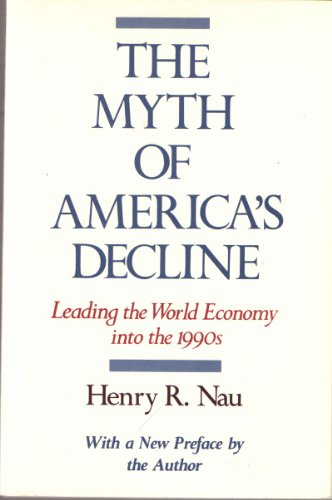The Myth of America's Decline: Leading the World Economy into the 1990s
Nau, Henry R.
About the Book
Description:
Seller Inventory # hafa_Silver_0195072723
About this title:
Synopsis: How can America be in decline and yet win the Cold War in 1989 and the Persian Gulf war in 1991? Because, as Henry R. Nau argues in this probing analysis of postwar policy, the Untied States, unlike the Soviet Union, shared power with its allies as it built a converging world community of political democracies and liberalized market. Today America leads that community as both the world's only military superpower and the one country Western governments trust to use military force for common objectives--a trust exemplified by the recent war in Kuwait.
A loss of relative power, Nau contends, is not troublesome if it leads to more convergent domestic values and institutions among countries. Over a period of forty years, carefully chronicled in this book, the United States pursued political and economic policies that successfully nurtured Western democracies and integrated industrial economies. Through open markets, America helped allies catch up; and through open societies, the industrial nations overcame ethnic and economic divisions and grew to trust one another more. Although the United States lost relative economic power, it gained political friends and still remains, economically, the world's leader in absolute levels of productivity.
Nor, according to the data assembled in this study, has the United States lost its ability to compete in foreign markets. The economic policies of the 1980s led to growth rates and manufacturing productivity increases that surpassed the boom years of American dominance from 1947-1967 and equaled or exceeded the performance of Germany and Japan in the latter part of the decade.
The threat to our future, Nau contends, does not come from trade competition with the allies. It comes instead from domestic divisions that immobilize America's fiscal and domestic policies and prevent the country from taking the lead role in assisting the historic transformation underway in Eastern Europe, the Soviet Union, and many developing countries. Americans have to decide whether half of their federal budget outlays should continue to go to middle class entitlements, distributed without regard to need, or whether some of these savings--as well as defense cuts--should go to needy people both at home and in the reforming countries abroad. Nau demonstrates that America can only live up to its high standards at home only if it recognizes that these standards are now widely recognized and accepted around the world. To turn America's back on a world yearning to be free would not only weaken the prospects for success in the reforming countries but scuttle America's self-image and confidence at home.
About the Author:
About the Author:
Henry R. Nau is Associate Dean and Professor of Political Science and International Affairs at the Elliott School of International Affairs, The George Washington University. He served in the State Department from 1975 to 1977 and on the National Security Council in the White House from 1981 to 1983.
Bibliographic Details
Title: The Myth of America's Decline: Leading the ...
Publisher: Oxford University Press
Publication Date: 1992
Binding: Soft cover
Condition: very good
